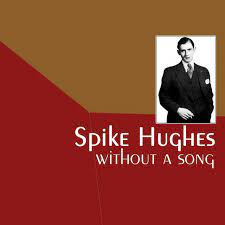
Daily Dose Of Jazz…
Patrick Cairns “Spike” Hughes was born October 19, 1908 in London, England and spent his childhood mostly with his mother, a psychiatrist who was involved in extensive travel in France and Italy, as well as a more settled period of education at Perse School in Cambridge. By 1923 when he was 15 he spent an extended period in Vienna, Austria studying composition with Egon Wellesz.
He began writing his first music criticism for The Times of London and heard his first jazz at the Weinberg Bar, Weihburggasse, a band led by trumpeter Arthur Briggs. Returning to the UK in 1926, Hughes had a solo cello sonata performed in London and wrote the incidental music for two theatre productions in Cambridge.
His interest in jazz was stimulated by the London revue Blackbirds, starring Florence Mills and Edith Wilson in 1926. It was an enthusiasm he shared with his friends, the composers Constant Lambert and William Walton and the conductor Hyam Greenbaum. He taught himself double bass using a German string bass made of tin, the spike of which led to his nickname. He formed his own jazz group in 1930 and was one of the earliest artists signed to Decca Records in England and recorded over 30 sessions between 1930 and 1933.
Originally billed as Spike Hughes and his Decca-Dents, but it was changed either to his Dance Orchestra or Three Blind Mice for smaller sessions. From 1931, he played regularly with the Jack Hylton Band and his career in jazz culminated in 1933 with a visit to New York, where he arranged three recording sessions involving members of Benny Carter’s and Luis Russell’s orchestras with Coleman Hawkins and Henry “Red” Allen from Fletcher Henderson’s band.
After the New York recordings, Spike ceased performing jazz and orchestrated and conducted shows for C B Cochran and using the pseudonym Mike wrote jazz reviews for Melody Maker, Daily Herald and The Times from 19531 to 1967. He established performance and recording opportunities for American bands in England.
He wrote radio plays accompanied by his own musical scores for the BBC, writing and broadcasting, conducting the BBC Theatre Orchestra, and for BBC Television. As a writer, regular BBC broadcaster and critic his subjects also included food and travel. He wrote sixteen composition, five film scores, fifteen books and recorded four albums,
Composer, arranger and double bassist Spike Hughes, who became better known as a broadcaster and humorous author, transitioned on February 2, 1987.
More Posts: bandleader,bass,history,instrumental,jazz,music


